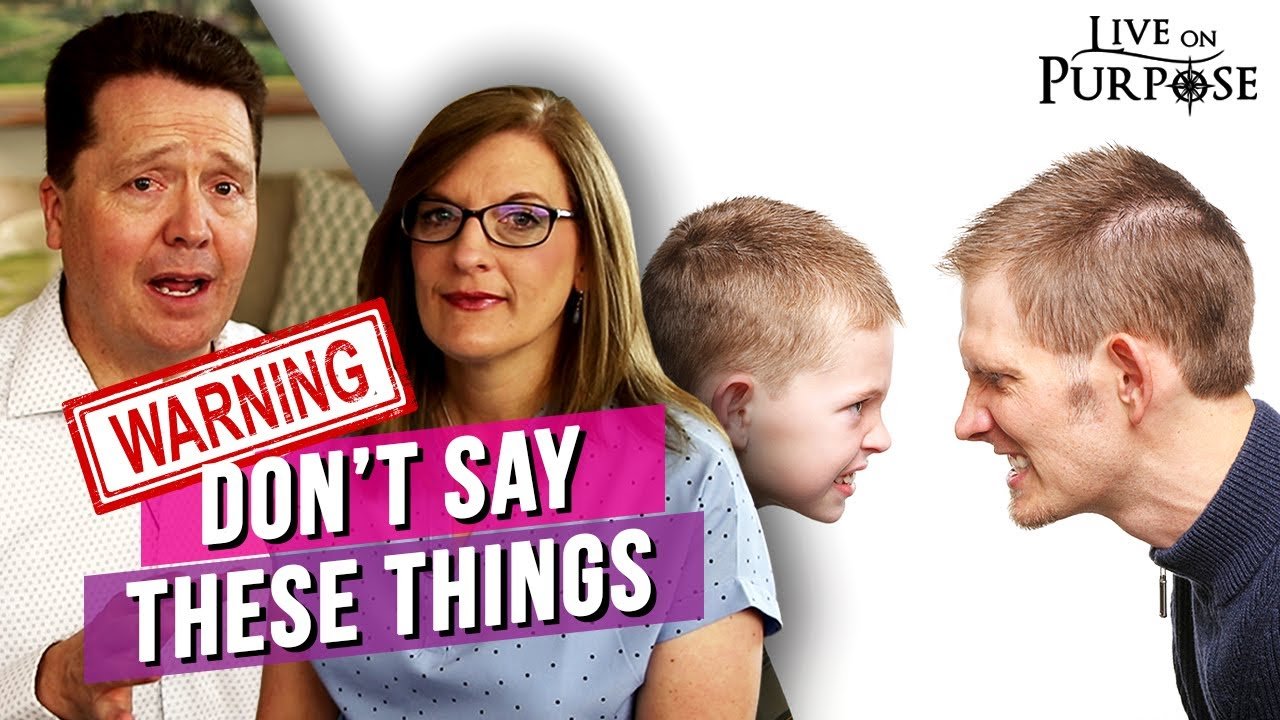In this video, Dr. Paul Jenkins and Vicki discuss seven things you should avoid saying to your child. They touch on phrases like “stop crying” and “why can’t you be more…” and suggest alternative ways to communicate with your child. They emphasize the importance of understanding and empathizing with their emotions and encourage expressing frustration and the need for calm instead of saying hurtful phrases like “I wish I never had kids.” The video also addresses the harm in saying “big boys don’t get scared” and emphasizes the importance of talking through fears. They also highlight the acceptance of mistakes as part of being human. The speakers invite the audience to check out the website ParentingPowerUp.com for more information and resources.
Talking through fears
As parents, it is important to address fears that our children may have. Fears can affect a child’s emotional well-being and can lead to anxiety and other negative emotions if left unaddressed. By talking through fears with our children, we can help them process their emotions, understand their fears, and develop coping strategies.
Importance of addressing fears
Addressing fears is crucial for a child’s emotional development. When fears are ignored or dismissed, children may feel invalidated and unheard. This can lead to feelings of isolation and anxiety. By taking the time to listen to our children and validate their feelings, we create a safe and supportive environment for them to express their fears and work through them.
Negative impact of ‘big boys don’t get scared’ mentality
The harmful mentality of “big boys don’t get scared” or “big girls don’t cry” can have a negative impact on a child’s emotional well-being. When children are told not to express their fears or emotions, it can lead to feelings of shame or inadequacy. This mentality reinforces the idea that it is not okay to experience fear or show vulnerability, which can hinder a child’s emotional growth and self-expression.
Alternative approach – discussing fears openly
Instead of perpetuating the harmful mentality of suppressing fears, we should encourage open discussions about fears. By creating a safe space for our children to talk about their fears, we show them that it is okay to feel scared and that their emotions are valid. This approach allows children to develop a better understanding of their fears and work through them in a healthy and constructive manner.

Harmful phrases to avoid
There are certain phrases that can be harmful to children and should be avoided. These phrases can have a lasting impact on a child’s self-esteem and emotional well-being. It is important to be mindful of our words and choose them carefully when communicating with our children.
Stop crying
Telling a child to “stop crying” invalidates their emotions and sends the message that their feelings are not important. Instead of dismissing their tears, we should take the time to understand why they are crying and offer comfort and support.
Why can’t you be more…
Using phrases like “why can’t you be more…” can make a child feel inadequate and ashamed. Instead of focusing on their shortcomings, we should work together with our children on developing positive behaviors and traits.
You always…
Labeling a child with phrases like “you always…” can lead to self-fulfilling prophecies and limit their potential. Instead, we should address specific behaviors and provide guidance and support to help them make positive changes.
What’s wrong with you?
Asking “what’s wrong with you?” can be hurtful and imply that there is something inherently wrong with a child. Instead, we should be empathetic and understanding, and help them navigate their emotions and concerns.
I wish I never had kids
Expressing regret or frustration about having children can have a detrimental impact on a child’s self-esteem and create a sense of guilt. Instead, we should express our frustration or need for a break in a healthy and constructive manner.
I’m on a diet
Talking about being on a diet can send the wrong message to children about body image and lead to unhealthy relationships with food. Instead, we should promote the concept of making healthy choices and emphasize the importance of overall well-being.
Alternative ways of communicating with your child
Effective communication with our children is essential for building strong relationships and encouraging their emotional growth. There are alternative approaches that we can take to communicate in a more positive and supportive manner.
Asking ‘why’ instead of dismissing emotions
Instead of dismissing a child’s emotions, we can ask them why they are feeling a certain way. By showing genuine curiosity and interest, we create a space for them to express themselves and help them better understand their own emotions.
Working together on behaviors
Instead of criticizing or blaming a child for their behavior, we can work together with them on finding solutions. By approaching behavior issues as a team, we foster a sense of collaboration and empower children to take ownership of their actions.
Expressing frustration and the need for calm
When we are feeling frustrated or overwhelmed, it is important to express our emotions in a healthy way. By role-modeling emotional regulation and communicating our needs for calm, we teach children how to navigate their own emotions and seek support when needed.
Emphasizing healthy choices
Promoting the concept of making healthy choices is essential for our children’s overall well-being. By encouraging healthy habits and choices, we help them develop lifelong skills for physical and emotional health.
Discouraging ‘I’m on a diet’
Instead of focusing on diets and weight, we should encourage our children to make healthy choices and develop positive relationships with food. By promoting balanced nutrition and regular physical activity, we instill healthy habits that will benefit them in the long run.
Promoting the concept of making healthy choices
We can teach our children to prioritize their well-being by teaching them the importance of making healthy choices. By involving them in decision-making processes and providing them with age-appropriate information about the benefits of healthy choices, we empower them to take control of their own health.
Accepting mistakes as part of being human
Mistakes are a natural part of life, and it is important for children to understand that making mistakes is a normal and necessary part of their growth and development. By accepting and embracing mistakes, we create an environment where our children feel safe to take risks and learn from their experiences.
Avoiding ‘what’s wrong with you?’
Asking “what’s wrong with you?” can imply that there is something inherently wrong with a child when they make a mistake. Instead, we should approach mistakes with empathy and understanding, emphasizing that mistakes are opportunities for growth and learning.
Encouraging acceptance and learning from mistakes
When our children make mistakes, we should focus on the lessons they can learn from them. By encouraging them to reflect on their actions, take responsibility, and make amends if necessary, we help them develop resilience and problem-solving skills.
Group coaching sessions at Parenting Power-Up
Parenting Power-Up offers group coaching sessions that provide support and guidance for parents. These group sessions allow parents to connect with others who may be experiencing similar challenges and provide a space for sharing experiences and learning from one another.
Benefits of group coaching
Group coaching provides a supportive and non-judgmental environment where parents can gain insights and strategies for effective parenting. It offers an opportunity to learn from experienced facilitators and share experiences with other parents, fostering a sense of community and support.
Availability and access to sessions
Parenting Power-Up offers various group coaching sessions that cater to different needs and schedules. Sessions can be accessed in person or online, ensuring that parents have the flexibility to participate in a way that works best for them.
Free training sessions
Parenting Power-Up offers free training sessions that cover a wide range of topics related to parenting and child development. These sessions provide valuable insights and practical strategies for parents to enhance their parenting skills and improve their relationships with their children.
Opportunity to participate in free training
Parents have the opportunity to participate in free training sessions that cover topics such as effective communication, setting boundaries, and promoting positive behavior. These training sessions offer valuable tools and resources that can be applied in everyday parenting situations.
Overview of training topics
The free training sessions cover a variety of topics that are relevant to parents of children of all ages. Topics include discipline strategies, nurturing emotional intelligence, promoting a growth mindset, and fostering healthy relationships. These sessions provide parents with practical tips and techniques that can be implemented immediately.
Parenting Power-Up website
The Parenting Power-Up website serves as a valuable resource for parents seeking information and support. The website provides access to articles, videos, and resources on a wide range of parenting topics, allowing parents to access information and support at their convenience.
Providing more information and resources
The Parenting Power-Up website offers a wealth of information and resources that cover various aspects of parenting and child development. From articles on effective communication to videos on positive discipline techniques, the website provides access to valuable resources that can support parents in their journey.
Benefits of visiting the website
By visiting the Parenting Power-Up website, parents can gain valuable insights, learn practical strategies, and access additional support. The website serves as a hub for helpful resources and information, allowing parents to proactively seek information and support for their parenting needs.
Conclusion
In conclusion, addressing our children’s fears and communicating with them in a positive and supportive manner is essential for their emotional well-being and development. By avoiding harmful phrases, embracing healthy choices, accepting mistakes, and seeking support through group coaching sessions and free training, we can create a nurturing environment that promotes growth and resilience. Remember to check out the resources and support available at Parenting Power-Up to further enhance your parenting journey.

